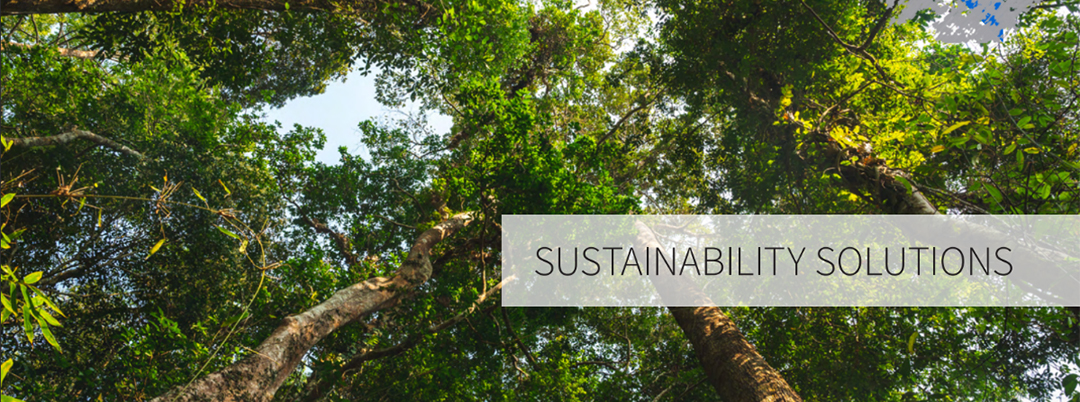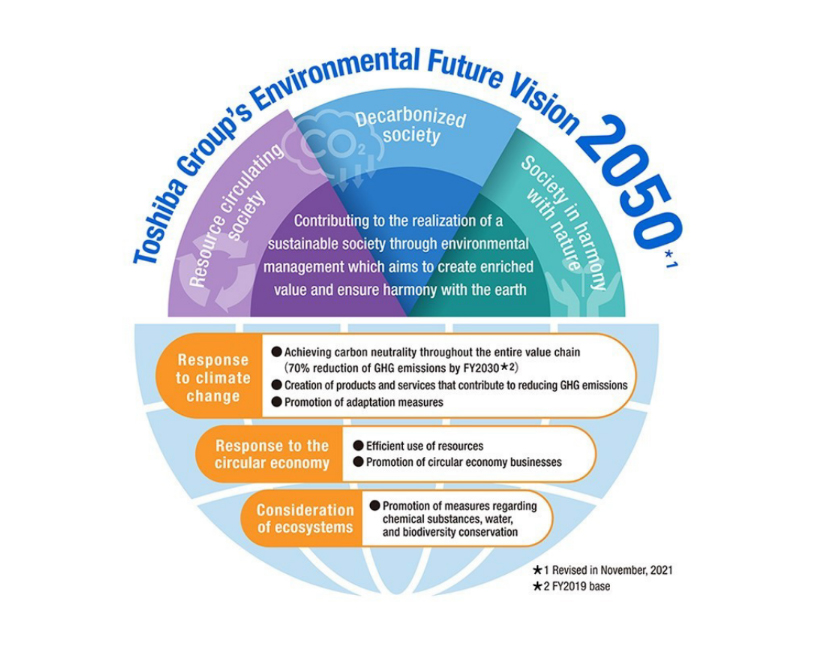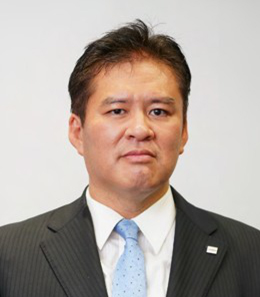
 Newsletter
Newsletter  Toshiba Shaping the Sustainable with its Next-Gen
Technologies
Toshiba Shaping the Sustainable with its Next-Gen
Technologies
Toshiba Shaping the Sustainable with its Next-Gen Technologies

COP27 set the stage for COP28 to continue the push towards a low-carbon future, particularly
in the realm of transitioning from fossil fuel. The research increasingly indicates that we
will have to not only lower emissions as much and as fast as possible but also remove excess
carbon that will continue to be emitted into the atmosphere from hard-to-abate sectors.
Technological solutions will also be central to decarbonization through initiatives such as
the digital transformation can act as an enabler to decarbonisation, or technologies for
carbon capture and sequestration.
Toshiba has the tools and the technology needed to accelerate the global energy transition
and reduce carbon emissions as much as possible. As such, Toshiba Group formulated the
Environmental Future Vision 2050 to address carbon neutrality, the circular economy, and a
society in harmony with nature. Toshiba will promote the implementation of initiatives in
three areas: “response to climate change”, “response to the circular economy” and
“consideration of ecosystems” so as to realize the ideal situatio by 2050. In November 2021,
we revised the vision “response to climate change” from 50% reduction across the Group's
value chain by FY2030 to “Achievement of carbon neutrality throughout the entire value chain
(70% reduction of GHG emissions by FY2030)”.

Toshiba recognizes the importance of maintaining a management foundations with integrity and
transparency to support our business activities, and, to that end, has set out the following
as material issues to be addressed by Toshiba Group so as to increase our corporate value.
| |
Vision for 2030 |
Materiality |
| For the irreplaceable global environment in which we live |
Promote corporate activities with full consideration for the global environment
throughout our value chain, from design, procurement, manufacturing, logistics
and sales, through to disposal. |
- Respond to climate change
- Respond to the circular economy
- Consider ecosystems
|
| For respect of human rights, to nurture people and technology, and
to give back to society |
Encourage every Group employee to feel pride and fulfillment in their work, and
to harness creativity and technolo-gy in collaborating with business partners to
realize rich value. |
- Secure, retain and train human resources
- Ensure employee health and safety
- Promote respect for human rights
- Promote sustainable procurement
- Strengthen R&D to stimulate innovation
|
| For further strengthening thorough governance |
Practice transparent corporate governance and optimal internal controls; and
execute management with integrity, trusted by stakeholders |
- Strengthen governance
- Strengthen cyber resilience
|
To learn more about the FY2022 performance and FY2023 Targets of Toshiba Group’s material
issues, click here .
Toshiba's Sustainable Growth Agenda: Forging a Greener Future

Since its founding in 1875, Toshiba has combined innovation and expertise to tackle
social issues. Toshiba’s goal is to achieve carbon neutrality and a circular economy
by building infrastructure that everyone can enjoy and a connected data society. In
this process, we will continually create value by maximizing the power of data, and
draw on the product expertise, technologies, and customer relationships we have
cultivated over the years to support social infrastructure, including the energy,
water treatment, transportation and devices businesses.
Toshiba group in India is making good progress in business expansion. In FY22,
consolidated revenue of all Indian Toshiba Group companies grew almost by 50%.
Toshiba can provide comprehensive solution to generate, transfer and store and smart
use of energy, we are also experts in water management and a reliable partner of the
government in its “Clean Ganga” initiative. Toshiba's SCiB™, a
rechargeable
lithium-ion battery ideal for hybrid vehicles, is receiving encouraging response
from the industry and we are partnering up with major car company to support Indian
Green mobility initiative.
We need to achieve growth along with protecting environment. By integrating
sustainability into our business goals, we will solve several problems caused by social
challenges. Toshiba’s management philosophy is “Committed to People, Committed to the
Future.” We believe we will contribute to a new better world.
Toshiba India's Sustainability Report: A Business Update on Environmental Responsibility
With the government’s strategy for accelerating the pace of sustainable economic development,
India is primed for ‘Green Growth’. With a rich heritage of almost 150 years of continuous
innovation and technological excellence, Toshiba is in a unique position to support India in
realizing its goals for sustainable growth.
Toshiba has been a reliable partner in India’s quest for sustainable energy security and can
provide comprehensive solution to generate, transfer and store and smart use of energy.
Toshiba can supply solutions and services in power plants by offering Cyber Physical Systems
and IoT as a service like EtaPRO™ to improve the efficiency and reliability of power
generating assets. In addition, our Carbon Dioxide Capture Utilization and Storage (CCUS)
solution helps to separate and capture CO2 from thermal power plants, resulting in
transition towards a carbon neutral society.
For energy Transmission & Distribution (T&D), Toshiba is a world leader in the supply of
integrated solutions for both conventional and renewable energy sources. To support the
transition towards renewable energy and combat climate change, we have been supplying our
clients with a wide range of high-quality, reliable and efficient transmission and
distribution equipment, including GIS.
We are also experts in water management and a reliable partner of the government in its
“Clean Ganga” initiative. Toshiba also contributes to the Clean Ganga initiative and so far
Toshiba has constructed a total of 10 sewage treatment plants across 3 states (Uttar
Pradesh, Bihar & Jharkhand), with a total installed capacity of 181 million litres per day
(MLD).
Toshiba has been spearheading this transformation through its technologically advanced
SCiB™
rechargeable lithium-ion batteries that present many industries an unprecedented opportunity
to decarbonize their energy consumption. With its wide industrial and infrastructure
applications, Toshiba's SCiB™ rechargeable lithium-ion batteries can minimize
environmental
impact, create economic value and contribute to carbon neutrality.
Toshiba supports India’s ambitious Green Mobility initiatives through its automotive
lithium-ion battery – SCiB™ rechargeable battery, contributing to improved fuel
consumption
efficiency and reduced CO2 emissions. For example, if CO2 emission reductions up to Scope
3*¹ are required, converting employee shuttle buses to EVs can be a countermeasure. With
Toshiba’s SCiB™ that offer a high level of safety rapid charging and long service
life, the
number of EV buses and the amount of rechargeable batteries required for operation can also
be greatly reduced. In 2022, Toshiba signed an agreement with EVage to supply its
SCiB™
cells for 10,000 EVage electric commercial vehicles.
Looking To The Future: New Technologies For A New World
In a rapidly evolving landscape, Toshiba pioneers the path forward, embracing cutting-edge
technologies to shape a bold future for our changing world. Toshiba Group showcased energy
solutions that play a crucial role in achieving carbon neutrality across the energy
lifecycle at the Japan Pavilion at COP28, organized by Ministry of the Environment,
Government of Japan (“MOE”). The Toshiba technologies the MOE has selected to showcase
include SCiB™, AEROXIA™ and P2C (power to chemicals)—that are
contributing to the global
goal of achieving carbon neutrality.
SCiB™ for Energy Storage and Smart-use
SCiB™ helps reduce fuel consumption and CO,/NOx emissions and life
cycle costs,
improves operating rates and enables the construction of highly safe and
reliable
battery systems. Applying SCiB™ to EV buses as an example, the
required number
of
buses and battery capacity can be reduced, thereby reducing lifecycle costs and
resource consumption. As batteries play an increasingly important role,
SCiB™
contributes to tackle social issues.
Watch our video to get to know about our SCiB™ technology: https://www.linkedin.com/feed/update/urn:li:activity:7136286463368863744/
Energy Transmission: AEROXIA™ Replaces SF6 in Power Facilities with
Eco-friendly Gas
Toshiba’s ground-breaking technology, AEROXIA™ is set to transform the
world of
energy transmission by replacing SF6 gas, commonly used in high-voltage
electrical
equipment, with an eco-friendly alternative derived from natural sources. The
environmental impact of using SF6 is staggering—over 20,000 times the global
warming
potential of CO2 when released into the atmosphere. Toshiba's
AEROXIA™ offers
eco-friendly, low-maintenance, and highly efficient solutions for electrical
power
using natural-origin gas alternatives.
Watch the video to get an in-depth look at AEROXIA™: https://www.linke-
din.com/feed/update/urn:li:activity:7137339108066000898
P2C (Power to Chemicals) that Transforms CO2 into Green Resources with Renewable Energy
P2C is the bridge between carbon capture and utilization in the CCU supply chain,
and
Toshiba has developed an advanced electrolysis catalyst that delivers the
world's
highest CO2 conversion rate. The process uses renewable energy, and acts on CO2
in a
gaseous state, not dissolved in water, converting it into carbon monoxide, an
important raw material for chemical synthesis.
Watch the video to find out all about our P2C technology: https://lnkd.in-
/gM2HmRcp
*1: Scope 3 encompasses emissions that are not produced by the company itself and are not
the result of activities from assets owned or controlled by them, but by those that it’s
indirectly responsible for up and down its value chain.


